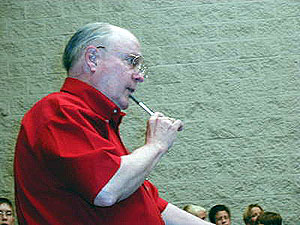|
Audio
Photos
More from MPR
Resources
Your Voice
|
Understanding the changing voice
August 8, 2003
 |
| John Cooksey works with a group of young singers at St. John's University. Cooksey teaches adolescent boys and choir directors how to deal with changing voices. (MPR Photo/Tim Post) |
Collegeville, Minn. — A room full of junior high and high school choir directors sit in an auditorium at St. John's University in Collegeville. They're about to get a demonstration of puberty's effect on the young male voice.
A small choir of 10 to 15-year old boys squeak their way through a version of "My Country 'Tis of Thee". The purpose of the uncomfortable rendition is to show what boys' choirs should not be asked to do, sing out of their range.
The St. John's based VoiceCare Network hopes to teach these choir directors about the strengths and weaknesses of adolescent singers. Axel Theimer, the Network's executive director, says the aim is to use science to show how the changing body effects a voice.
"Suddenly one arm seems longer one morning or an ear seems out of place and you look in the mirror and you seem totally out of proportion. There are huge changes going on and very similar changes are going to be effecting the voice," Theimer says.
 | |||
The VoiceCare Network relies on the research of voice expert John Cooksey from the University of Utah. Cooksey says choir directors should use care when they work with a group of changing voices.
"If you say 'You can't sing your part so I don't want you in my choir', or 'You're in the wrong class because you can't match pitches on your part', one single sentence can destroy a student, and it does happen, it happens too often sometimes," Cooksey says.
Cooksey has studied changing male voices for more than two decades. He's developed a categorization system.
"If you hear one of these boys talk, and get an average pitch by having them count backwards from 20, then you have a starting place, you come very close to identifying the stage just from that one criterion," Cooksey says.
Cooksey says choir directors should recognize the limits of a changing voice, both at the top and bottom of the scale. But he also wants directors to hear how good an adolescent voice can sound, and how that can be used in a choir.
Kathi Bernhard teaches high school choir in Elgin, Illinois. Bernhard says she didn't know what to do with the boys in her choir before she started working with the Voice Care Network.
 | |||
"I would probably advise singing lightly or sing the part that suits them best and I'd put them somewhere in between voice parts. It was difficult finding music to fit them because I didn't know much about it. I tended to ignore that and hoped they just fit in and changed soon," says Bernhard.
Now Bernhard says she understands changing voices. That helps her find the appropriate singing parts, and it helps her explain what's happening to the boys themselves.
15-year old Duece Lovelace from the Motley-Staples choir say that's information he needed.
"I thought at first I was getting some kind of cold and my choir teacher told me that it's just your voice is starting to change," Lovelace says.
Steve Homberg is choral director at Motley-Staples High School. Homberg is a firm believer in the VoiceCare Network's techniques. He says the most important thing is to give boys with changing voices the right kind of music.
"You put music in front of them that incorporates all the different ranges. And rather than telling the boys 'Someday you're going to be good enough to fit in this range' you say 'This music is good enough to fit in your range'," Homberg says.
Voice expert John Cooksey says there are some pieces out there made just for changing voices, but he'd like to see more. Cooksey and the folks at St. John's VoiceCare Network are encouraging composers to write music that uses the unique qualities of all adolescent voices.
|
News Headlines
|
Related Subjects
|
